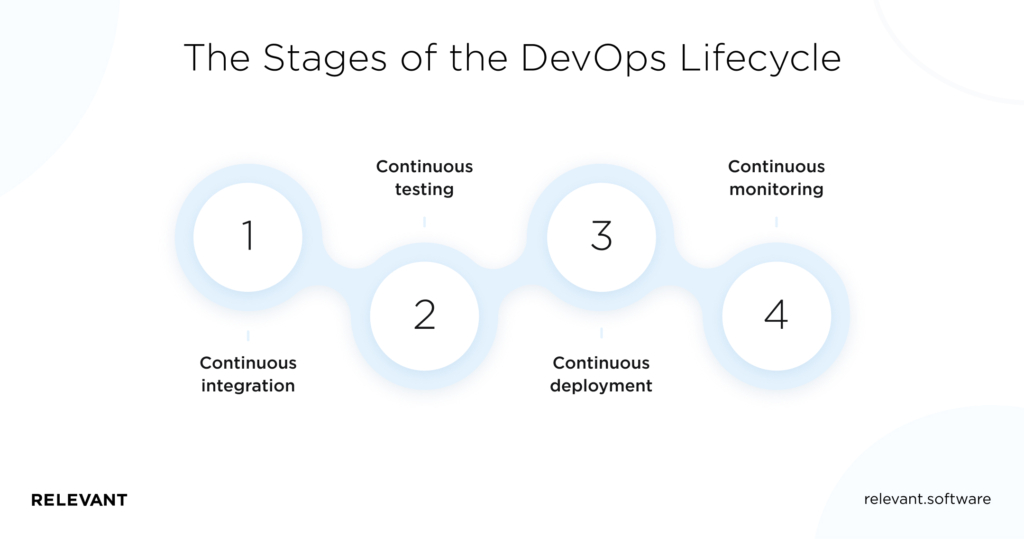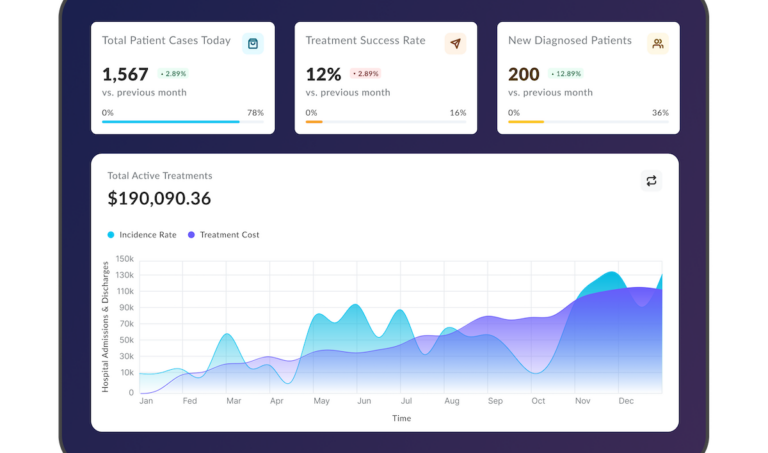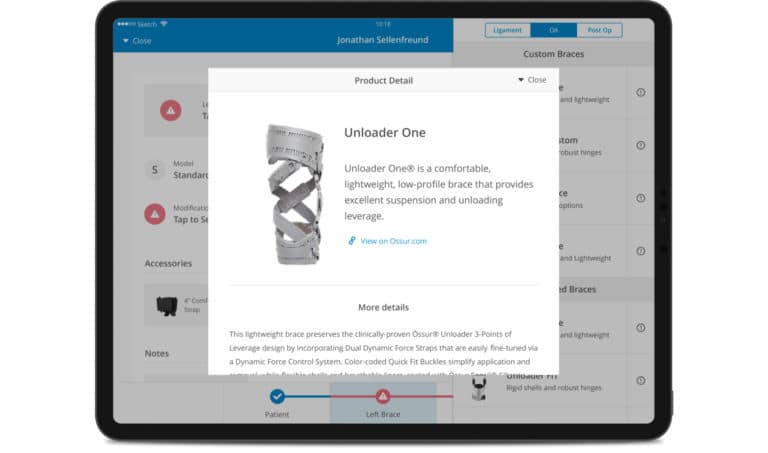Can DevOps Outsourcing Be an Effective Solution for My Company?
Updated: July 22, 2024
Due to the global shift to remote access, many companies worldwide have to digitize their businesses urgently. This transformation can’t happen without high-quality DevOps services that have become more valuable than ever. At the same time, the technical DevOps teams that can manage the complex cloud infrastructure landscape are critically lacking.
You may have encountered a similar problem too. Do you know how other organizations solve it? They outsource DevOps. Outsourcing DevOps to a trusted offshore partner allows them to operate at higher speeds with better results, more flexibility, and fewer headaches. That is true not only for small and medium-sized enterprises but also for large corporations with a huge staff.

We provide companies with senior tech talent and product development expertise to build world-class software. Let's talk about how we can help you.
Contact usWant to know more details? As a custom software development provider with eight years of experience and 200+ successful projects, we will explain why DevOps outsourcing is a promising and profitable tactic and how you will benefit from partnering with a DevOps outsourcing company.
Table of Contents
Why is DevOps important?
A prerequisite for the popularity of DevOps was the ubiquity of Agile practices focused on accelerating the release of a finished product and increasing the number of released versions. Usage of microservice architecture was another driver that reduced the labor intensity of preliminary design and made it possible to constantly release new versions of a software product.
However, before moving on to the processes, let’s be more specific about DevOps. It is a culture of automating repetitive software delivery processes to minimize the risk of human error and the effort required to deliver products and services consistently. Implementing DevOps means fewer errors, less development time, automated updates and rollbacks, and more.
DevOps fosters flexible collaboration between R&D and other IT departments by offering a cross-functional mode of operation. The combination of development (Dev) and IT operations (Ops), usually separate, allows for faster time-to-market, maximizes efficiency, and provides better tools to scale in the future.
Automated deployments and standardized production environments – key aspects of IT operations in the DevOps model, make processes predictable and eliminate repetitive tasks so that the team can focus on more important work.
For example, Fidelity Worldwide Investment seized the opportunity to adopt a DevOps approach and implement an automated software release platform that would enable it to meet its rollout schedule. This decision resulted in more than $2.3 million a year in cost savings for this application alone.
What are the stages of DevOps workflow?
Since the future of IT operations is DevOps-driven, it is essential to understand what the DevOps process looks like. Each stage of the DevOps lifecycle aims to close the cycle between development and operations and drive production by:

Continuous integration
CI is how developers can update their pieces of code in a repository that is available to the entire project team. That is where the code is tested and verified automatically. This repository helps to reduce delays so any team member can find the most recent and tested version of the code.
Continuous testing
After CI, the next logical step is CD or continuous delivery. The CD helps the operations team automatically build, test, and package code changes made during CI for release. Similar to CI, CD automates the delivery process for faster build releases.
Continuous deployment
It is a process that uses tools that automatically test and then release code as soon as a change in the code is detected. Continuous deployment eliminates the need to schedule release dates and speeds up the feedback loop.
Continuous monitoring
It provides valuable information that accompanies the team’s workflow. Continuous monitoring ensures higher reliability and better software security.
What are the DevOps’ roles and responsibilities?
Now that we’ve covered the fundamental principles of DevOps, we need to outline how they manifest in the roles and responsibilities of DevOps. Let’s first look at the key roles in the DevOps team.

- The DevOps Evangelist or Team Leader implements and maintains DevOps practices in the organization.
- The Code Release Manager handles new features or updates and provides post-release support for the product.
- The Automation Architect takes over the development and maintenance of the CI / CD pipeline and creates and administers containers and virtual machines.
- The DevSecOps Engineer builds and maintains a secure infrastructure and mitigates potential threats and vulnerabilities.
- The IT Operations Engineer takes care of the security and reliability of an organization’s infrastructure, equipment, systems, and other elements.
- The Configuration Management Engineer configures, optimizes, and maintains infrastructure components.
- The DevOps Data Analyst analyzes data and generates informative reports based on it.
The roles and responsibilities of DevOps are broad and require specialized skills from individuals on the team. At the same time, the culture of DevOps implies shared responsibility for the team’s actions. Let’s inspect them.

Planning, testing, and developing applications and infrastructure
A DevOps-focused company distributes responsibility for developing, testing, and releasing applications across engineering and IT. Separating responsibility for the development and release pipeline leads to more reliable and secure solutions.
CI/CD pipelines support
The DevOps teams build the CI/CD pipeline and optimize processes, people, and tools. DevOps-focused engineers can continually improve the pipeline, not only in operations but also in labor skills. The team moves testing and QA into the development cycle, allowing the team to test without speed limits continuously.
Automation implementation
The DevOps team uses automation to make software development consistent, reliable, and efficient. Automation is present throughout all software lifecycle stages, from building and unit testing to packaging and deploying to environments. Eliminating repetitive manual tasks makes conveyors more stable, efficient, happier, and satisfied.
Incident management
DevOps teams take on-call and incident management responsibilities with shared accountability and code ownership. Responding to incidents in the production environment allows them to know more about their systems. Therefore, developers write code that better suits their applications and infrastructure, resulting in fewer incidents. In addition, IT teams are more involved in the development lifecycle, which helps them proactively improve the reliability of their deployed services.
Monitoring
Monitoring is only a step in building well-observable systems, but it is essential for building reliable systems. Organizations need to collect data and analyze it to plan further actions. The DevOps team identifies blind spots in applications and infrastructure and then figures out how to control those services.
DevOps tools
According to AWS, DevOps outsourcing can increase your company’s application delivery speed by 100%. How exactly? Through a complex combination of different corporate philosophies, practices, and tools.
The DevOps tools used at each stage will differ from organization to organization, depending on the systems you already have, the skill level of your developers and testers, and the applications you deploy.

What are the common benefits of DevOps for your business?
The advantages of DevOps over traditional SDLC overcome the long-standing division between dev and ops. Because the methodology is an integral part of the Scaled Agile Framework, many of the concepts and principles of SAFe, such as short iterations, small package sizes, fast feedback, and more, can be applied in DevOps.

Planning and organizing benefits
- Short development cycles. DevOps is associated with fast and frequent delivery and shorter development cycles. Software changes are made whenever necessary. Continuous Integration and Delivery are DevOps practices that allow small increments in delivery and immediate feedback loops.
- Dedicated teams instead of disparate skills. Previously disparate departments can now communicate more openly and transparently, increasing their productivity and developing new skills. With DevOps, you can decide at the right time and plan your deployment at the right time.
Performance-related and cultural benefits
- Increased efficiency. Traditionally, a development environment is built from scratch. Still, a DevOps environment can be created using automated processes to cope with rapid product growth, changing workloads, and changing needs.
- Improved communication and collaboration. DevOps means a big cultural shift that removes barriers to communication and makes it easy for employees to collaborate and share resources. And the strongest DevOps players are those who understand the value of teamwork.
- Reduced recovery time. DevOps practices are especially well suited for minimizing the impact of bottlenecks, rollbacks, and deployment failures on overall performance. When development cycles are shorter and new releases are released more frequently, the average time to find bugs and crashes is also significantly reduced. It is easier to detect the smallest code defects early with DevOps, and if errors are encountered, they take less time to fix.
Operational and strategic advantages
- Reliability and scalability with minimal risk. DevOps enables teams to quickly deploy new software while protecting existing on-premises data in a distributed environment. It is a flexible process that increases the flexibility and reliability of your solutions. DevOps practitioners emphasize the importance of coordinating team efforts while maintaining the integrity of the development environment. This way, the team will keep user-friendliness when making updates and changes to the product.
- Cost savings. DevOps initiatives drive innovation that adds value to the business while reducing maintenance and upgrade costs, eliminating unnecessary capital expenditures, and reducing project complexity.
- Innovation and experimentation. The accelerated software delivery frees developers’ time to innovate, generate ideas, and update applications. That leads to even better changes in the software.
What is DevOps profit for different stakeholders?
Different business goals shape their DevOps requirements. The CIO’s goals differ from the needs of the CEO, IT manager, or any other stakeholder.
For example, IT managers need to improve procedural and technological performance. As a result, the benefits of DevOps for the IT manager are:
- Improved software performance
- Fewer defects
- Lower release cost
- Frequent release of new features, fixes, and updates
- Improved MTTR (mean time to recovery)
- Lower investment cost
The organization’s CTO / CIO emphasizes strategic goals, including people-centered metrics, to successfully implement DevOps. Thus, DevOps CIOs highlight the following advantages:
- Increased team member engagement
- Greater flexibility and adaptability
- Individual development and cross-skill
- Freedom to brainstorm and experiment
- Increased team member engagement
- Better process control
- Reliable and fast fixes and extended online support
For the CEO, the demands from DevOps are lower operating costs and higher revenues. The following are the benefits of DevOps in line with the CEO’s corporate vision:
- Improving product quality
- Satisfied clients
- Lower production cost
- Increased revenue
- Reliable IT infrastructure
- Less downtime
- Increase the productivity of the organization
Why do companies choose to outsource?
The relevance of DevOps continues to grow as many organizations want to take advantage of the opportunity to speed up software delivery without sacrificing quality. That is especially important for businesses that want to occupy a vacant niche by rapidly entering the market.
A vast majority (86%) of the 654 respondents in a recent survey from Harvard Business Review Analytic Services said that it is essential for their company to develop and put new software into production quickly.
In addition, every business is interested in reducing technology and labor costs. Therefore, by 2027, the global DevOps market is predicted to grow to $23 billion, almost six times bigger than in 2020.

But, according to the 2020 Atlassian DevOps Trends Survey, 85% of companies have experienced problems implementing DevOps, and 37% of them noted that lack of skills among employees was one of the major obstacles.
Qualified DevOps resources in the US are known to be scarce. According to the 2020 Upskilling Enterprise DevOps report, nearly 60% of enterprises believe recruiting DevOps talent is a significant challenge.
Indeed ranks DevOps engineers as one of the top 3 most challenging IT roles in North America because DevOps requires an advanced skill set and at least five years of development and operational experience.
Another issue is high employee turnover: 48% of organizations say they have difficulty retaining DevOps resources, says DevOps Institute in their report. Companies that can find qualified employees pay them big bucks. It is not uncommon for seasoned DevOps engineers to receive $126,000 per year or more.
For comparison, a qualified DevOps specialist in Ukraine earns around $39 000 a year. A lack of local talent and rising wages are two reasons companies consider outsourcing their DevOps responsibilities.

Service model matters
When implemented correctly, DevOps outsourcing can provide organizations with instant access to highly skilled resources with the tools and expertise to get started right away while avoiding the headaches and costs of building their in-house team. DevOps vendors offer three options to support continuous delivery, testing, and integration:
- Operations management outsourcing while in-house teams focus on higher-value work like maturing the DevOps practice and automation.
- Outstaffing DevOps engineers for a long-term project, but not on an ongoing basis. It will come in handy when you do not have time to wait for a position to close.
- Outsource automation to a vendor with technical talent and experience for fast results.
- Full DevOps support, also known as DevOps as a Service (DaaS). The outsourcer takes full responsibility for building automation in the environment, working side by side with in-house developers, and managing day-to-day business.
What is DevOps-as-a-Service?
By choosing DevOps as a Service (DaaS), you outsource a third-party vendor’s development and implementation process. Offshore partners independently form a competent team to design, develop and integrate DevOps solutions and practices into your business, adapting them to your goals.
DevOps-as-a-Service providers offer you the ability to track every step of the software delivery process and provide feedback to the development team when a problem is found in a production environment.
And since they are already experts in their field, they will cost you less in the long run than trying to create equal opportunity internally. Thus, by outsourcing peripheral tasks to a third party, you can focus on your priorities and channel the freed-up resources towards innovation.
Standard outsource DevOps services that offshore partners can offer your business: implementation of cloud services, delivery pipeline, infrastructure security and audit, process optimization and automation, etc.
DevOps outsourcing vs. in-house DevOps team, which is best for you
Some tech companies choose to do their software development, and there is nothing wrong with that.
Cons of DevOps in-house team
The creation of an in-house team presupposes long-term cooperation, the goal of which is high-quality work and avoiding possible mistakes. After all, the longer the team works on one project, the more they know about your product or service. Thus, with the in-house DevOps team:
- You can painlessly redistribute internal tasks.
- You get full control over the team’s processes for a higher cost.
- You can create infrastructures according to your client’s requirements and partner toolkits.
- With a DevOps culture, the team will have a high level of understanding.
A large company (over 500 people) can benefit from building its in-house team, especially if it plans to expand its IT staff even further. In this case, on-site training and adaptation will simplify infrastructure management.
What are the challenges of hiring an in-house DevOps team?
While many companies feel more confident working with their team, building an internal DevOps department can be costly and extremely time-consuming. While the idea of putting together your in-house DevOps team might be sensible, it has the following disadvantages:
- You will waste a lot of time finding qualified personnel, training employees, setting up infrastructure, and defining processes.
- The organization of the workplace and goodies for team members will cost you a round sum.
- The internal team is often distracted by internal tasks, wasting time, resources, and efficiency.
- Internal employees are accustomed to similar tasks and working conditions and generate fewer fresh ideas.
- If someone from the team leaves, you will have to be puzzled by hiring specialists or completely suspending the project.
What are the advantages of DevOps outsourcing?
The pandemic has proven that teleworking can deliver exceptional results powered by automation and orchestration. And DevOps is ideal for outsourcing, making concurrent collaboration unnecessary and providing greater visibility into remote work. So, check what you can get.
- DevOps outsourcing allows you to leverage existing talent rather than building from scratch.
- Outsourcing companies are technically relevant, as they constantly test various solutions and approaches.
- Transferring DevOps tasks to a third-party partner saves you from employee churn and staff turnover problems.
- You can increase or decrease the size of your team with no administrative overhead.
- The DevOps outsourcing company is delivering documented results according to agreements and contracts.
- Unlike your DevOps team, an outside group will save you a lot of money.
- Finally, remote teams are interested in providing the best possible service for the client to continue the collaboration.

What are the challenges of outsourcing DevOps?
DevOps outsourcing is a viable option for increasing profitability and achieving market goals faster. The DevOps services provider forms a team according to your requirements and the conditions of your business. However, when choosing DevOps-as-a-Service, remember:
- While the dedicated development team provides DevOps automation and continuous deployment, the cost can rise in complex cases.
- The DevOps team will integrate existing work relationships and build processes from scratch.
Let’s briefly summarize the above. So, if you are a small or medium company or startup, DevOps outsourcing is the best option for you. You can hire a software development team for less and gain access to global talent. If money isn’t an issue, you might create your in-house DevOps team. But keep in mind that if your company’s core capabilities are not software engineering, building your DevOps team will get a lot harder.
Outsourcing DevOps: How to make it work
We understand it may be painful for you to entrust your product to a third-party vendor. But if you do decide, then we recommend starting with the following steps.

Define DevOps objectives
For example, if you want to migrate from a traditional data center to the cloud or automate a cloud solution, you can trust the DevOps team. It will identify the best services for your business, help you optimize the cost of cloud solutions, and take on over a third of the work that needs to be done.
Or, for example, your software solution stores and processes large amounts of data. You need to invest in DevOps so your team can optimize data flows and processing.
Choose the right DevOps service provider
As you explore the technical capabilities of potential DevOps outsourcing partners, find out if they have the skills and tools, certifications, and completed projects backed by customer reviews.
DevOps means infrastructure and applications, so a DevOps outsourcing company must experience a wide range of infrastructure-oriented software and tools such as Docker, Puppet, Ansible, SaltStack, and more.
Start to collaborate
Delegating your DevOps tasks to a managed service provider is easy. Since DevOps-as-a-service is an integral part of each of our 200+ completed projects, here’s a quick overview of how we get started the collaboration process with our clients.
We analyze the pain points of DevOps implementation, create a roadmap, and recommend tools and processes to automate deployment cycles in your infrastructure. The analysis will help determine the number of resources required to meet your requirements: one DevOps consultant for support or a group of full-time DevOps engineers.
Further, we develop a communication plan, agree on work and deadlines, determine the parties’ responsibilities, and confirm our agreements with a contract. To provide the best service, we appoint an account manager from our side, with whom you can discuss any changes, improvements, or problems.
Our company allocates a group of DevOps engineers with an established DevOps stack to support the project and implement the goals under the contract. We provide monthly status reports and meetings dedicated to planning activities and improving performance.
Why Relevant?
If you’ve already decided to outsource DevOps and are looking for an experienced technical partner who meets the above requirements, Relevant is here for you.
- We have been providing outsourcing services for over eight years. And during this time, we have completed over 200 projects for clients worldwide.
- We offer a proven combination of processes, tools, and approaches that deliver measurable results for our clients.
- We tailor specifications in each area according to client and project needs, team topology, application structure, and budget.
- Our DevOps experts work with a wide range of technologies, including Google Cloud, Azure, AWS, Docker, Kubernetes, Terraform, Ansible, and can implement:
- End-to-end DevOps
- Infrastructure as code
- Application release automation
- CI-CD pipeline orchestration
- Containerization
- Microservices architecture
- Cloud migration and managed services
- DevOps consulting
Output
So, if you are looking for a way to simplify release delivery, save time and reduce the burden on key team members and your budget, you just need to partner with Relevant.
Our DevOps team takes the hassle out of planning, developing, testing, deploying, and shipping your product. We can help you innovate, enter new markets and show your competitive edge way faster. Contact us to find out how to hire DevOps engineers in our company!
FAQ
Why should I implement DevOps practices?
DevOps helps companies create a stable operating environment by delivering quality and secure software in a much shorter time frame with fewer errors and bugs, promoting version control, and optimizing costs through continuous integration.
Can DevOps be outsourced?
DevOps helps companies create a stable operating environment by delivering quality and secure software in a much shorter time frame with fewer errors and bugs, promoting version control, and optimizing costs through continuous integration.
Should you outsource DevOps?
The answer is yes, especially if you want to leverage the potential of technical talent beyond the local and get more flexible development and better results. DevOps outsourcing lets you focus on bigger tasks, increase agility, and reduce IT costs through increased productivity. But you will only get these benefits by choosing an experienced supplier you can trust.
What is the cost of DevOps services?
The price depends on many factors. These are the expected workload and the amount of data processed, the size and location of the infrastructure, due dates, and more. Contact us to learn more about the pricing of DevOps services or if you want to hire DevOps engineers.
Our core services:
Do you want a price estimate for your project?
Do you know that we helped 200+ companies build web/mobile apps and scale dev teams?
Let's talk about your engineering needs.
Write to us











